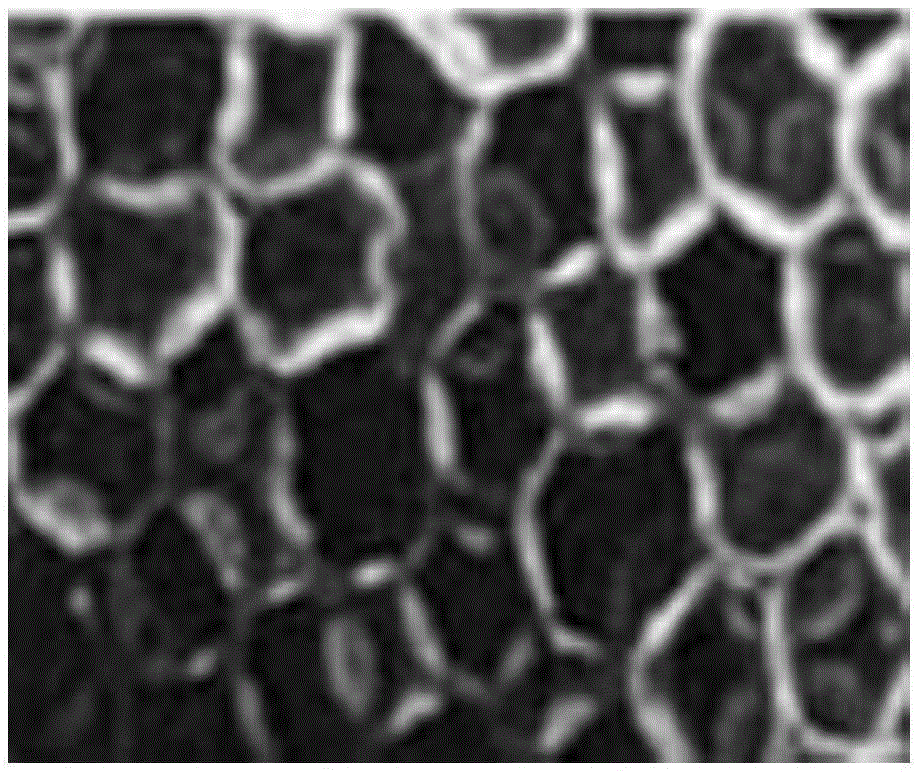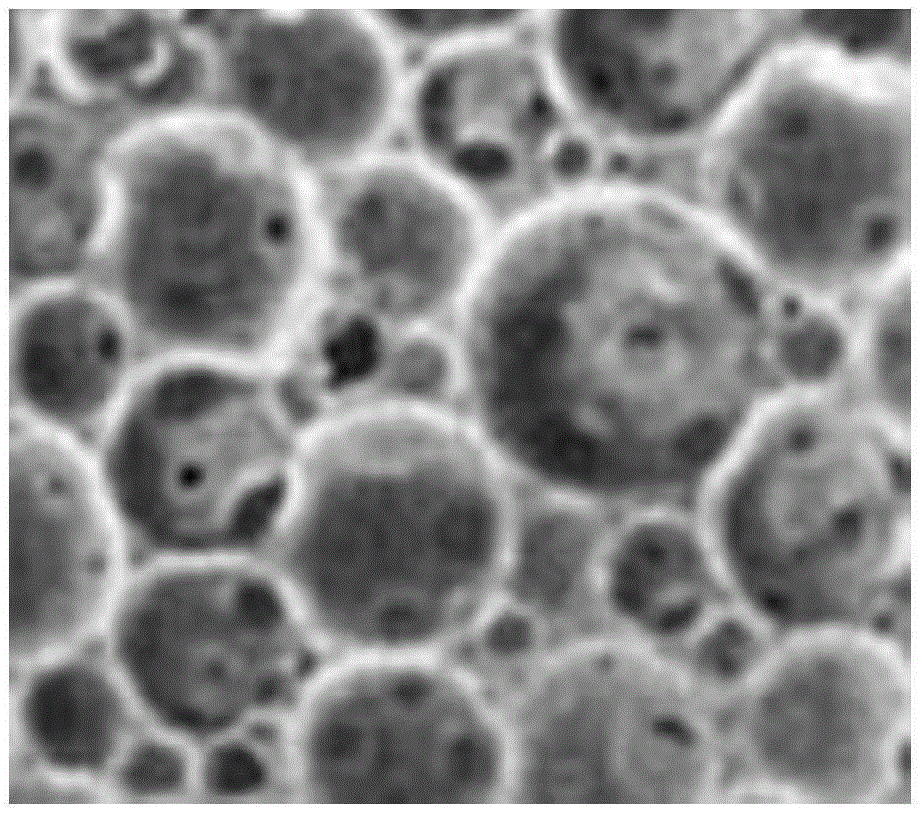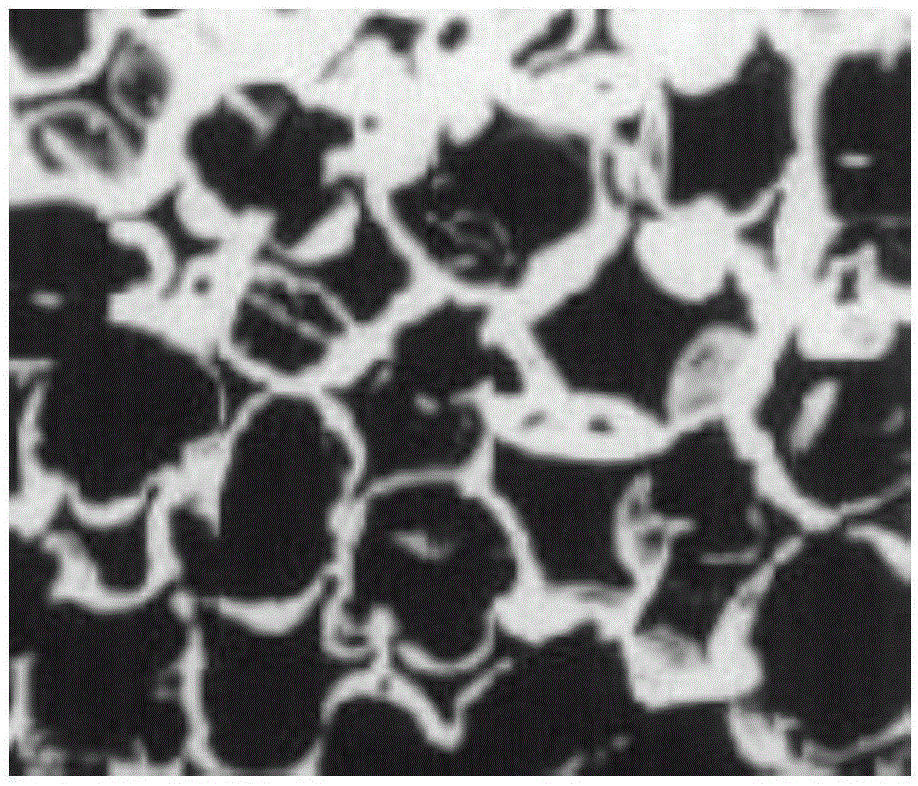Material used for preparing rigid foamed plastic, and preparation method of rigid foamed plastic
A technology of rigid foam plastic and foam stabilizer, which is applied in the field of materials for manufacturing rigid foam plastics and the preparation of rigid foam plastics, and can solve the problems affecting the rigid thermal conductivity of foam, high foam crosslinking density, and restricting the application of foam plastics. It can improve the effect of catalytic reaction, arrange orderly and densely, and improve the effective utilization rate.
- Summary
- Abstract
- Description
- Claims
- Application Information
AI Technical Summary
Problems solved by technology
Method used
Image
Examples
Embodiment 1
[0058] (1) Preparation of component A: Take 80kg of high-functionality polyester polyol (brand: PS-4027), 0.5kg of catalyst 1 # (The mass ratio is PT303:BX405=2:3), 20kg HCFC-141b, 0.3kg water, 1kg foam stabilizer (the mass ratio is B84803:AK8818:SILBYK-9231=3:3:4), 4kg The joint agent (mass ratio is glycerol: pentaerythritol = 1:1), placed in the material tank of component A, stirred at high speed for 20 minutes, and set aside.
[0059] (2) Preparation of component B: take 84kg of isocyanate TDI, 0.1kg of catalyst 2 # (The mass ratio is MB20:T-120=1:1), put it in the material tank of component B, stir at high speed for 20 minutes, and set aside.
[0060](3) Rigid foam molding preparation: inject component A and component B into the foaming machine respectively, stir at high speed for 15 seconds, control the temperature of the material at about 25°C, and inject it into the existing foam under the conditions of relative humidity <70%. The inner wall is coated with a mold rele...
Embodiment 2
[0062] (1) Preparation of component A: Take 85kg of high-functionality polyester polyol (brand: PS-4027), 0.55kg of catalyst 1 # (The mass ratio is PT303:PT302=2:3), 23㎏ isopentane, 0.35㎏ water, 1㎏foam stabilizer (the mass ratio is B-84803:AK8882:SILBYK-9231=3:3:4), 4 ㎏ Cross-linking agent (mass ratio: glycerol:trimethylolpropane=1:1), put in component A material tank, stir at high speed for 20 minutes, set aside.
[0063] (2) Preparation of component B: take 89kg of isocyanate PAPI, 0.1kg of catalyst 2 # (The mass ratio is MB20:T-125=1:1), put it in the material tank of component B, stir at high speed for 20 minutes, and set aside.
[0064] (3) Rigid foam molding preparation: inject component A and component B into the foaming machine respectively, stir at high speed for 15 seconds, control the temperature of the material at about 25°C, and inject it into the existing foam under the conditions of relative humidity <70%. The inner wall is coated with a mold release agent and...
Embodiment 3
[0066] (1) Preparation of component A: take 90kg of high-functionality polyester polyol (brand: PS-4027), 0.6kg of catalyst 1 # (The mass ratio is PT303:PT302=1:1), 25kg cyclopentane, 0.35kg water, 1kg foam stabilizer (the mass ratio is B-8534:AK8882:B-84805=3:4:3), 4 ㎏ Cross-linking agent (mass ratio: glycerol: sorbitol = 1: 1), put in the material tank of component A, stir at high speed for 20 minutes, set aside.
[0067] (2) Preparation of component B: take 94kg of isocyanate PAPI, 0.12kg of catalyst 2 # (The mass ratio is T-120:T-125=5:7), put it in the material tank of component B, stir at high speed for 20 minutes, and set aside.
[0068] (3) Rigid foam molding preparation: inject component A and component B into the foaming machine respectively, stir at high speed for 25 seconds, control the temperature of the material at about 26°C, and inject it into the existing foam under the conditions of relative humidity <70%. The inner wall is coated with a mold release agent ...
PUM
| Property | Measurement | Unit |
|---|---|---|
| acid value | aaaaa | aaaaa |
| compressive strength | aaaaa | aaaaa |
| compressive strength | aaaaa | aaaaa |
Abstract
Description
Claims
Application Information
 Login to View More
Login to View More - R&D
- Intellectual Property
- Life Sciences
- Materials
- Tech Scout
- Unparalleled Data Quality
- Higher Quality Content
- 60% Fewer Hallucinations
Browse by: Latest US Patents, China's latest patents, Technical Efficacy Thesaurus, Application Domain, Technology Topic, Popular Technical Reports.
© 2025 PatSnap. All rights reserved.Legal|Privacy policy|Modern Slavery Act Transparency Statement|Sitemap|About US| Contact US: help@patsnap.com



